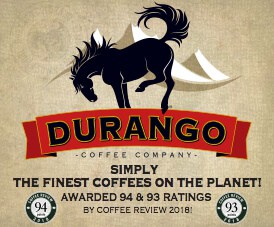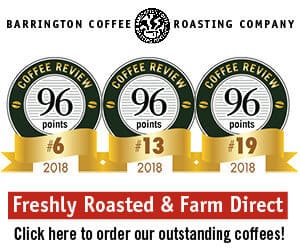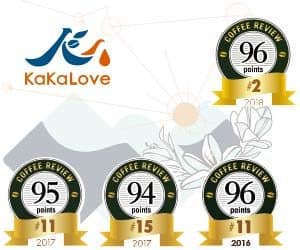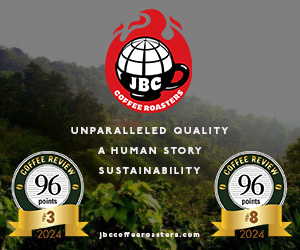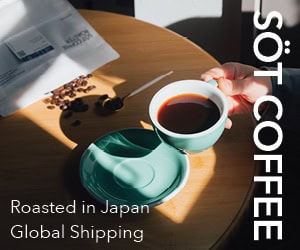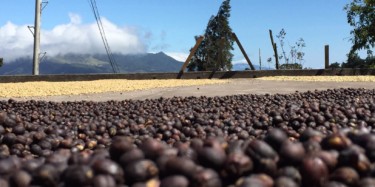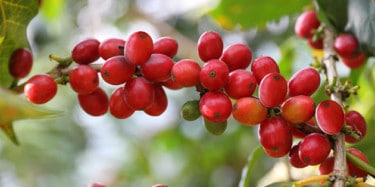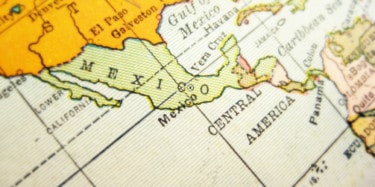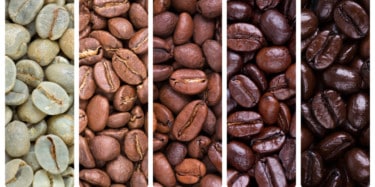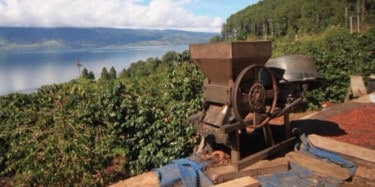Produced by La Palma & El Tucan, an innovative, quality- and sustainability-focused Colombia producer, from trees of the celebrated Gesha (also Geisha) variety of Arabica. This coffee tied for the second-highest rating in a tasting of women-produced coffees for Coffee Review‘s June 2017 tasting report. Based in the San Diego area, Bird Rock Coffee Roasters is a retailer and wholesaler focused
SEARCH RESULTS
Top 30 Coffees of 2016
We are pleased to present our list of the Top 30 Coffees of 2016, Coffee Review’s fourth annual ranking of the most exciting coffees we reviewed over the course of the past year. In 2016, we cupped thousands of samples and published nearly 400 coffee reviews. Approximately 90 of the reviewed coffees scored 94 points or higher. Obviously, all coffees earning scores of 94 points or more are
Kenya Guama Peaberry
This outstanding coffee was selected as the No. 1 coffee on Coffee Review’s list of the Top 30 Coffees of 2016. Produced from trees of the SL-28 and SL-34 varieties of Arabica. Despite grower discontent and urban encroachment on prime coffee lands, Kenya continues to produce some of the world’s most elegant and distinctive coffees. This sample consists entirely of peaberries, a kind of bean that
Sumatra Tano Batak
This exceptional coffee was selected as the #27 coffee on Coffee Review’s list of the Top 30 Coffees of 2016. It was grown by indigenous Batak people, who have been involved in coffee production since the practice was brought to Sumatra by the Dutch in the late 19th century. Coffees from the northern part of the Indonesian island of Sumatra are admired for their complex aromatic wood and fruit
Beyond the Review: Celebrating Coffees in Depth
This is not your typical Coffee Review tasting report. In fact, it is something of an unplanned improvisation. We originally had scheduled a tasting report on coffees of Costa Rica this month, but we decided to postpone it until next month, October. It turned out that Costa Ricas were slow to arrive in roasters’ warehouses this crop year, and we feared that if we rushed the article we would miss
Kenya Thageini
Despite challenges ranging from unclear government coffee policy and urban encroachment on prime coffee lands to chronically unstable weather, the famed Kenya coffee auction system and its participating cooperatives continue to produce some of the world’s most elegant and distinctive coffees. Based in the San Diego area, Bird Rock Coffee Roasters is a retailer and wholesaler focused on organic and
Indonesia Sumatra Tano Batak
This coffee was grown by indigenous Batak people, who have been involved in coffee production since the practice was brought to Sumatra by the Dutch in the late 19th century. Coffees from the northern part of the Indonesian island of Sumatra are admired for their complex aromatic wood and fruit notes that appear to result largely from unorthodox fruit removal and drying practices called “wet
El Salvador Finca Loma La Gloria
This lot is comprised entirely of the much admired, bold-bean Pacamara variety of Arabica, a cross between the giant-beaned Maragogipe variety and Pacas, a selection of the heirloom Bourbon. It was processed by the dry or "natural" method, in which the beans are dried encased in the entire fruit. Based in the San Diego area, Bird Rock Coffee Roasters is a retailer and wholesaler focused on organic
Panama La Esmeralda Bosque Geisha
With its bold, boat-shaped beans and distinctive floral and crisply cacao-toned cup, the Gesha (also Geisha) variety of Arabica continues to produce some of the world’s most unique coffees. This is a wet-processed or “washed” version, meaning the fruit skin and pulp were removed from the beans immediately after harvesting and before drying. Based in the San Diego area, Bird Rock Coffee Roasters is
Category Rankings
Over the past couple years, Coffee Review's annual “Top 30” ranking of the year's most noteworthy coffees has attracted considerable attention. As many readers have noted, our rankings tended to favor high-scoring coffees produced from botanical varieties of Arabica with striking sensory properties: coffees of the Gesha/Geisha variety, coffees from the distinctive traditional Ethiopian varieties,
Panama La Esmeralda Bosque Lot 1 Gesha
With its bold, boat-shaped beans and distinctive floral and crisply cacao-toned cup, the Gesha (also Geisha) variety of Arabica continues to produce some of the world’s most unique coffees. This is a wet-processed or “washed” version, meaning the fruit skin and pulp were removed from the beans immediately after harvesting and before drying. Based in the San Diego area, Bird Rock Coffee Roasters
Costa Rica Santa Lucia Cup of Excellence #7
Finca Santa Lucia is a fifteen-acre coffee farm located in the Valle Central (Central Valley) region of Costa Rica. This is a wet-processed or “washed” coffee, meaning the fruit skin and pulp were removed from the beans immediately after harvesting and before drying. Based in the San Diego area, Bird Rock Coffee Roasters is a retailer and wholesaler focused on organic and socially responsible
Guatemala Finca La Bolsa
Maragogipe (Maragojipe in Spanish; also spelled Maragogype) is a variety of Arabica first discovered growing near the Brazilian town of the same name. It is a seldom-grown, low-yielding variety that produces enormous beans. Based in the San Diego area, Bird Rock Coffee Roasters is a retailer and wholesaler focused on organic and socially responsible coffees; it was awarded the “2012 Micro Roaster
Traditional Coffees of Central America: Quest for the Classic
We’ve seen two conflicting, yet overlapping, trends at the growing end of specialty coffee over the past decade. On one hand, greater and greater homogeneity. Traditional coffee tree varieties, varieties that may not taste unique, but do taste subtly different, are being replaced by disease-resistant, higher-yielding varieties that incorporate robusta genes and, well, usually don’t taste different
Guatemala El Socorro Maracaturra
Maracaturra is a relatively recently developed cross between the huge-beaned Maragogipe and the compact-growing Caturra varieties of Arabica. Based in the San Diego area, Bird Rock Coffee Roasters is a retailer and wholesaler focused on organic and socially responsible coffees; it was awarded the “2012 Micro Roaster of the Year” title from Roast Magazine. Visit www.birdrockcoffee.com or call
Panama Lino Esmeralda Geisha Natural
This exceptional coffee was selected as the No. 18 coffee on Coffee Review’s list of the Top 30 Coffees of 2015. With its bold, boat-shaped beans and distinctive floral and crisply cacao-toned cup, the Gesha (also Geisha) variety of Arabica continues to produce some of the world’s most unique coffees, and the Esmeralda versions from the Peterson family farms in Panama remain among the most
Alemu Kochere Yirgacheffe
Yirgacheffe is a coffee region in southern Ethiopia that produces distinctive coffees from traditional varieties of Arabica long grown in the region. Yirgacheffe coffees like this one processed by the wet or washed method (fruit skin and pulp are removed before drying) typically express great aromatic complexity and intensity with a particular emphasis on floral notes. Like virtually all Ethiopia
Roaster of the Year Competition
Developed to recognize and inspire excellence in roasting, the Roast Magazine Roaster of the Year competition is now in its 12th year. There are two award categories - macro roaster and micro roaster - which are based on company mission, commitment to sustainable practices, commitment to employees and educational practices, coffee quality, commitment to and involvement in the industry, and
El Salvador Finca Loma La Gloria
This lot is comprised entirely of the much admired, bold-bean Pacamara variety of Arabica, a cross between the giant-beaned Maragogipe variety and Pacas, a selection of the heirloom Bourbon. It was processed by the red honey method, meaning the beans were dried after removal of the fruit skins, but with more than 50% of the fruit flesh still adhering to the beans. From producer Anny Pimentel; the
Elegant Earth: Wet-Hulled Sumatras and One Sulawesi
Wet-hulling is not an obscure Olympics sailing event nor (at least to my knowledge) a special trick in waterskiing or wakeboarding. It is a fruit removal and drying variation that contributes much of the distinct character of traditional Indonesia coffees, particularly those from Sumatra and Sulawesi. It is also practiced on other Indonesian islands, almost everywhere in Indonesia where small


